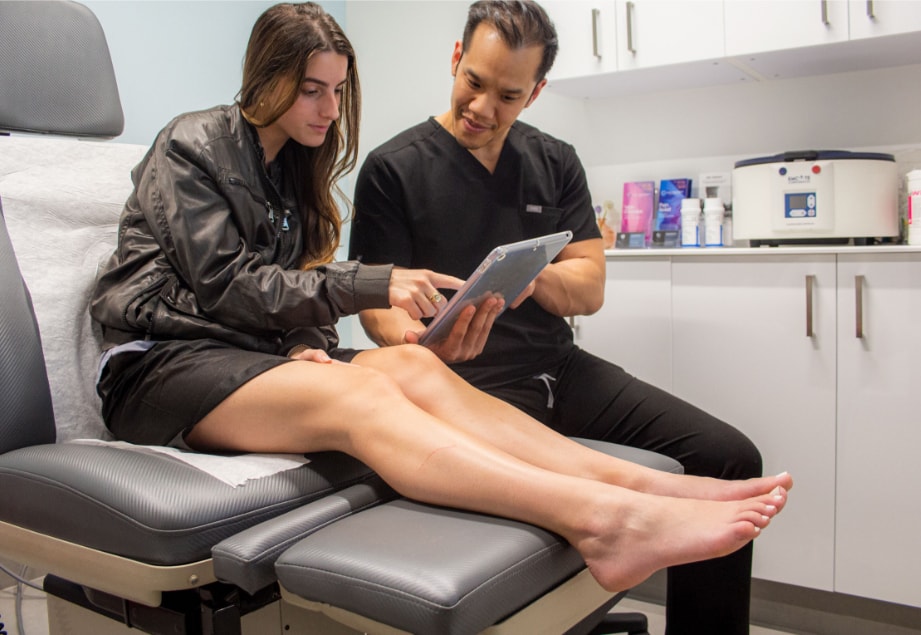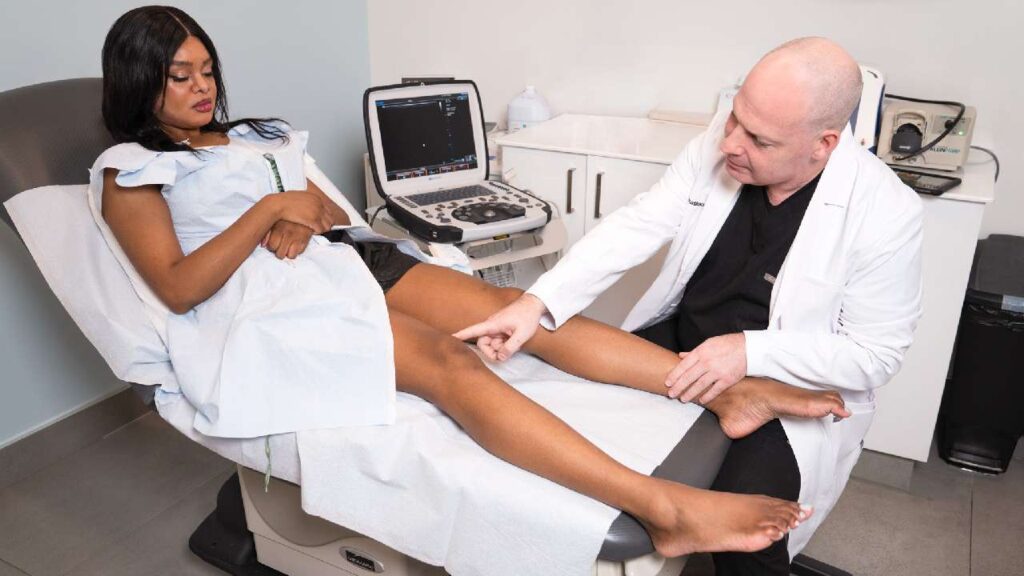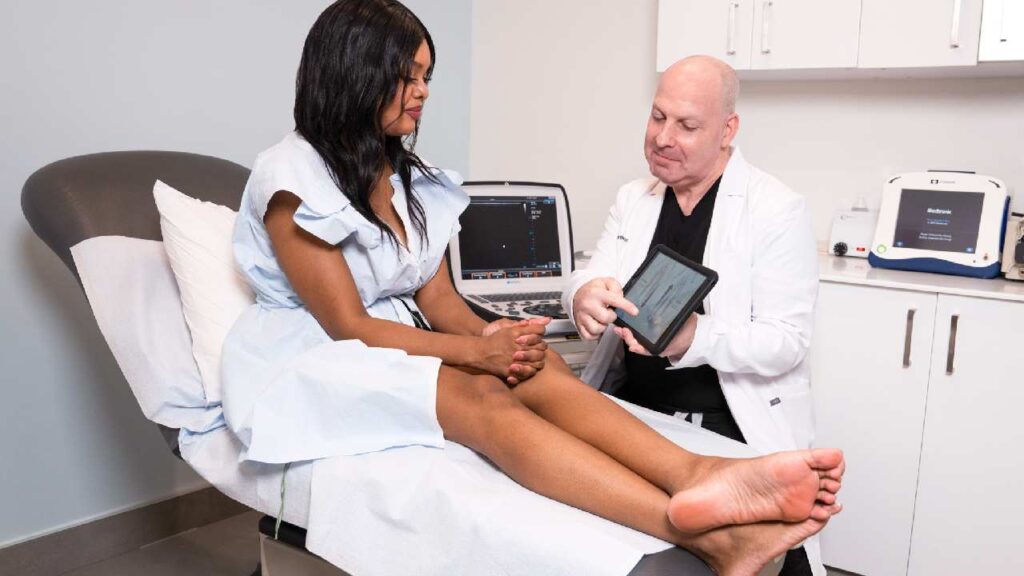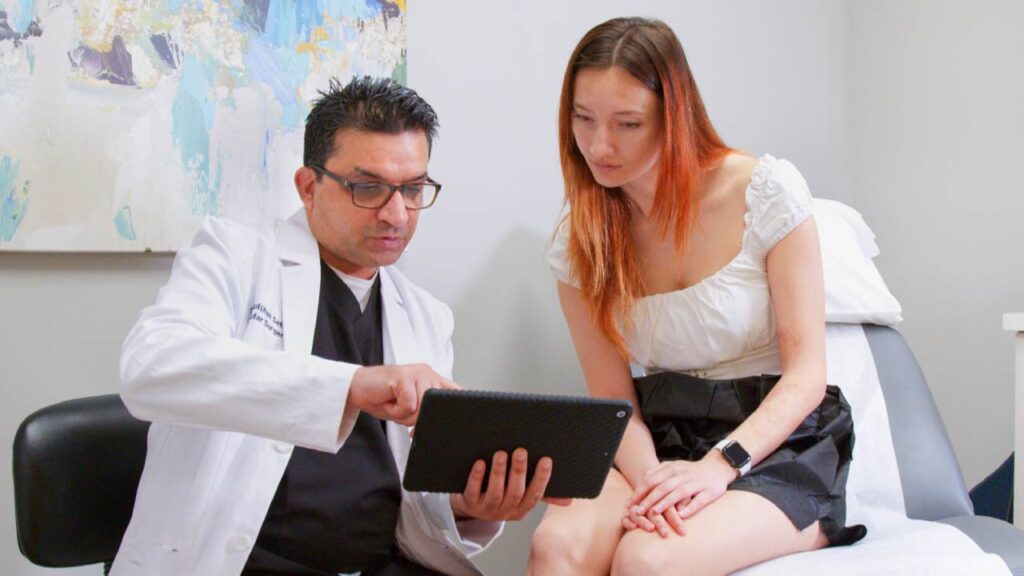How Should I Get My Varicose Veins Treated for Fast Results?
The fastest way to treat varicose veins is with a minimally invasive procedure like radiofrequency ablation, sclerotherapy, endovenous laser treatment, vein adhesives, or mechanochemical ablation. These treatments are applied through the skin, with small catheters and needles, so there are no wounds to heal and no downtime for recovery. Patients don’t need general anesthesia or hospitalization with these methods, so they can be in and out of the vein clinic in under 30 minutes. Click HERE to book rapid treatment for varicose veins in NYC today!

Does Homeopathy for Varicose Veins in Legs Work Fast?
Homeopathy is not a quick way to reduce varicose veins in the legs. In fact, it is not guaranteed to do anything beneficial at all, and might be detrimental to your health. While there are home treatments like compression stockings that reduce the pressure in your veins, these are designed to minimize symptoms, not remove varicose veins.
Homeopathic supplements and remedies are not regulated by the FDA and aren’t held to safety standards regarding purity, quality, dosage, or additional ingredients. If you want quick relief from varicose veins, visit a vein doctor in New York. Our Harvard-trained vein doctors will offer lifestyle tips to improve your symptoms that safe and effective. Homeopathy delays the medical treatments you need and might even worsen your symptoms.
What’s the Best Vein Center in New York for Quick Solutions?
The best vein center in New York for quick varicose vein repair is one that specializes in minimally invasive procedures and is run by board certified vein doctors. Some vein clinics are staffed by dermatologists or vascular surgeons, but their methods are often too little or too much for varicose veins. Dermatology typically treats small facial spider veins, and surgery is no longer necessary for most varicose veins. Choose our award-winning vein clinics in Midtown and FiDi for world-renowned, minimally invasive care.
What’s the Best Clinic for Varicose Veins Near Me in NY?
If you’re looking for the “best clinic for varicose veins near me,” look no further than our state-of-the-art NYC vein clinics at 290 Madison Avenue and 156 William Street. If you live outside of Manhattan, visit our clinics in West Islip, Jericho, or Hampton Bays, NY. Each of our New York vein treatment clinics is fully accredited and run by board certified vein doctors who trained at Ivy League institutions.
Which Vein Treatment Clinic in NY Should I Avoid?
If you have varicose veins, it’s best to avoid surgical vein clinics until you’ve seen a minimally invasive vein doctor. In the 1990s, surgery was a common varicose veins treatment. But medical advances have enabled gentler techniques to replace surgery for the majority of patients. Many surgeons aren’t trained in the latest techniques, including newer surgical methods like ambulatory phlebectomy, so choose a minimally invasive vein doctor to avoid unnecessary surgery.
It’s also best to avoid dermatologists and cosmetic spas for varicose veins. While these practitioners can treat certain vein issues, like broken capillaries in the face, varicose veins are usually caused by deeper broken valves in the veins that require ultrasound guidance and endovenous treatments, rather than surface laser treatment. If the varicose veins treatment is only skin-deep, most results will fail, either immediately or eventually. Treating broken valves is essential to reduce blood pressure within the vein. Without this step, varicose veins or spider veins will continue to develop.
Are Superficial Varicose Veins & Chest Veins Urgent Issues?
Some patients’ varicose veins are asymptomatic and never produce significant problems. Other patients have moderate symptoms like swelling, cramping, heaviness, itching, and fatigue in their legs. While these symptoms aren’t life-threatening, they can dramatically impact quality of life. Some patients will also develop more complicated issues like venous eczema, venous ulcerations, hyperpigmentation, and profuse bleeding.
And in some cases, patients develop blood clots that break loose and cause a pulmonary embolism. Where your symptoms will fall along this continuum is impossible for you to predict. But vein doctors with diagnostic tools like Duplex Ultrasound can identify problems before they arise. This is the primary reason to see a vein doctor ASAP, rather than trying to treat varicose veins at home. Because the question isn’t just, “What can you do to treat varicose veins?”, but also, “How can you treat them quickly to prevent complications?”.
Does High Blood Pressure Cause Varicose Veins If I Delay?
Pressure building within a vein is the impetus for many varicose veins. When doctors refer to high blood pressure, they’re often referencing high blood pressure in the arteries (hypertension), not the veins. While these blood vessels work together, veins and arteries have different tasks and compositions. Arteries are larger and stronger than veins, and they pump blood down and away from the heart, so they do not need valves to do their job.
Veins return blood to the heart, which is more difficult due to gravity, so they rely on valves in the veins to close once blood flows through, so it continues on an upward trajectory. When valves fail, blood flows in reverse, elevating pressure in the vein, which generates bulging, tortuous varicose veins. So, high blood pressure in arteries doesn’t directly cause varicose veins. It’s elevated pressure within a vein that’s responsible for those protuberant blood vessels.
Do Varicose Veins Cause High Blood Pressure Eventually?
Varicose veins slow the transit of blood back to the heart. So, they cause things like aching and cramping in your legs and swollen, discolored lower limbs. High blood pressure in the arteries is a separate issue that usually stems from aging, obesity, disease, or smoking. But arteries and veins must work in unison for efficient circulation, and many patients have both varicose veins and high blood pressure.
Scientists are studying the impact of one issue on the other and of treatments that might work for both. Lifestyle adjustments like avoiding sitting or standing for too long and maintaining a healthy weight and active lifestyle, as well as the cessation of smoking, will reduce blood pressure in both types of blood vessels.
What Happens If Varicose Veins Are Left Untreated?
If varicose veins go untreated, there are several potential outcomes. Some patients will have symptoms like restlessness, fatigue, or swelling in the legs after a long day. Other patients will develop bleeding that’s hard to control when there is an abrasion to the skin. Some will contend with venous ulcerations that are slow to heal. Others will experience hyperpigmentation of the skin that is difficult to reverse.
Some will develop scaly, itchy rashes like venous stasis dermatitis or venous eczema. And others will develop blood clots or a deep vein thrombosis that poses the risk of a pulmonary embolism. Don’t ignore your varicose veins and hope that they’ll disappear. The risks are too high, particularly when gentle solutions are just moments away. Book rapid treatment for varicose veins in NYC today at our premier vein clinic!





